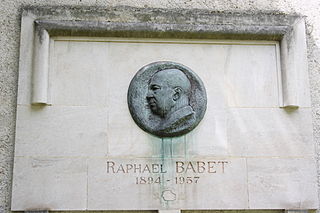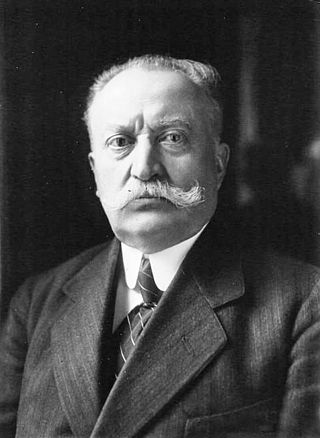
Modibo Keïta was a Malian politician who served as the first President of Mali from 1960 to 1968. He espoused a form of African socialism. He was deposed in a coup d'état in 1968 by Moussa Traoré.
The Rassemblement Démocratique Africain, commonly known as the RDA and variously translated as African Democratic Assembly and African Democratic Rally, was a political party in French West Africa and French Equatorial Africa which was important in the decolonization of the French empire. The RDA was composed of different political parties throughout the French colonies in Africa and lasted from 1946 until 1958. At certain points, the RDA was the largest political party in the colonies in Africa and played a key role in the French government headed by the Democratic and Socialist Union of the Resistance (UDSR). Although the regional party largely dissolved in 1958 with the independence votes for the colonies, many of the national parties retained the RDA in their name and some continue to do so. The political ideology of the party did not endorse outright secession of colonies from France, but it was anti-colonial and pan-Africanist in its political stances.
The Sudanese Union – African Democratic Rally (US-RDA) was a political party in Mali.

African Solidarity for Democracy and Independence is a communist party in Mali. It was founded by Cheick Oumar Sissoko and Oumar Mariko in 1996; Sissoko is the party's President and Mariko is its Secretary-General, the top post in the party. The party is Pan-Africanist in ideology, is affiliated internationally with the International Communist Seminar, a grouping organised by the Workers Party of Belgium, and is in part an outgrowth of the 1991 demonstrations against the military rule of President Moussa Traoré. Mariko was head of the Association of Students and Pupils of Mali (AEEM) during the 1991 protest movement which overthrew the government.
Albert Liurette was a Guinean physician and politician. He was born in Kouta. Liurette studied at the Ecole de medicine in Dakar, obtaining a diploma in African medicine. Sergeant at 2e R.I.C.(French Army, Deuxième Régiment d'Infanterie Coloniale), he was arrested by the Wehrmacht and prisoner at Frontstalag 180 until 1941. Ahead of the June 17, 1951, election to the French National Assembly, Liurette was placed on the second place on the list of the French Section of the Workers' International (SFIO). Obtaining 67,480 votes (30.5%), the SFIO won two of the three seats allocated to Guinea. Yaciné Diallo and Liurette were elected to the National Assembly.
Mamadou Ouédraogo was a politician in the French Upper Volta.
Fily Dabo Sissoko was a Malian writer and political leader, born 15 May 1900 at Horokoto. He died 30 June 1964, imprisoned at Kidal. Fily Dabo Sissoko is chiefly remembered as one of the most influential political leaders of pre-independence Mali, primary conservative rival to Mali's first President Modibo Keita, and an influential writer of the Negritude movement.
The Socialist Party of Guinea was a political party in Guinea, founded ahead of the November 1946 National Assembly election. The party grew out of the Fulani Club at the École William Ponty. The list of the Socialist Party for the election consisted of Mamba Sano and Barry Diawadou. The list won one of the two seats accorded to Guinea, and Sano was elected. All in all, the list of the party had obtained 30,982 votes.
Paul Cuttoli was a French politician.
Paul Saurin was a French politician.

Raphaël Babet was a French politician.

René Château was a French philosopher, poet and politician.

Louis Antériou was a French politician.

Pierre Hubert Alexandre Henri Appell was a French politician.

Victor Augagneur was a French politician.
Jacques Rolland was a French politician. He represented the Radical Party in the National Assembly from 1956 to 1958. Rolland was a friend of Emmanuel Levinas, introduced through a mutual acquaintance, the medievalist Bruno Roy; he wrote an introductory essay to the 1982 publication of Levinas's De l'évasion, entitled "Getting Out of Being by a New Path".
Édouard Ramonet was a French politician. He represented the Radical Party in the Constituent Assembly elected in 1945, in the Constituent Assembly elected in 1946 and in the National Assembly from 1946 to 1958. He was Minister of Commerce and Industry from 1958 to 1959.
Georges Pianta was a French politician. He represented the National Centre of Independents and Peasants (CNIP), the Independent Republicans from 1962 to 1978 and the Union for French Democracy (UDF) from 1978 to 1981 in the National Assembly. He was the mayor of Thonon-les-Bains from 1944 to 1980.

Elections to the French National Assembly were held in French Sudan on 2 January 1956 as part of the wider French parliamentary elections. Four members were elected, with the Sudanese Progressive Party (PSS) and the Sudanese Union – African Democratic Rally (US–RDA) winning two each. Mamadou Konaté and Modibo Keïta were elected on the US–RDA list, whilst Fily Dabo Sissoko and Hamadoun Dicko were elected for the PSS.








